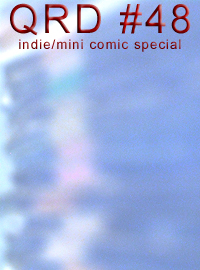
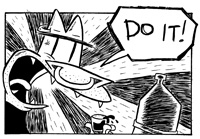
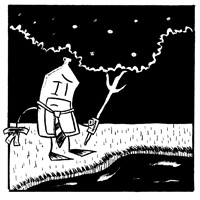
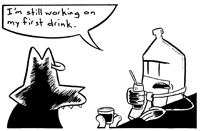
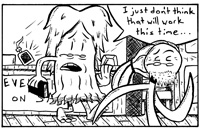
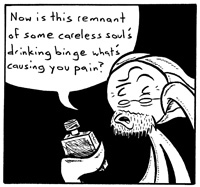
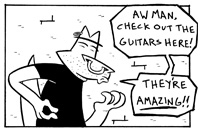









February 2011
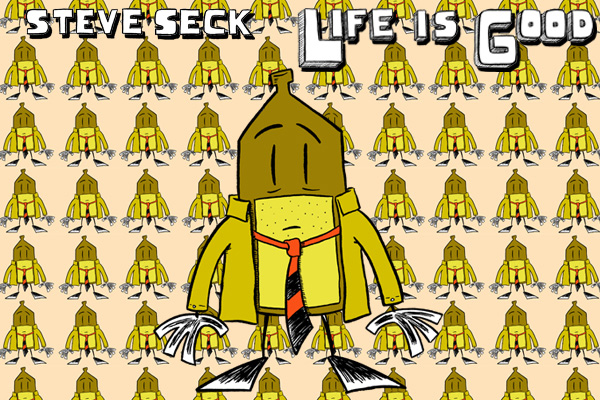
City: Jersey City, NJ
Comics: Steve Seck’s Life is Good, various 1-shots
Websites: www.secktacular.com
QRD – How old were you when you first got into comics & did you always stick with them or did you come back to them?
Steve – I’ve been into comics since before I could read. My parents had a few Peanuts & Mad collections that I examined front to back numerous times before I could even understand what they were about. I don’t think there’s ever been a time when I wasn’t reading comics - even when my focus shifted almost entirely to playing music in high school, I still kept up with the most recent issues of Bone coming out. I’d have to say that the indie comics of the late 90s & early 2000s - James Kochalka, Alex Robinson, Tony Millionaire, Craig Thompson, Doug TenNapel, etc. - brought me back in stronger than ever though & ultimately lead me to going to school for cartooning.
QRD – What was the first comic book you ever bought?
Steve – Probably a Muppet Babies or Bullwinkle comic when I was 3 or 4.
QRD – How old were you when you put out your first comic?
Steve – 25.
QRD – What decade do you think produced the best comics?
Steve – Hm... I don’t particularly pay attention to that sort of thing - good comics is good comics.
QRD – Why comics instead of just writing or drawing?
Steve – If I were only writing I’d constantly be wishing I was drawing & vice versa.
QRD – Do you see mini-comics & indie comics as paths to mainstream comics or as their own unique media?
Steve – 99% of the comics I read are minis or indie comics, so I’d say I see them as their own unique media. They can certainly be a path to the mainstream, if that’s what you want; but I don’t see them existing for the sole purpose of “breaking” someone.
QRD – How many copies of your comic do you print in your first run?
Steve – I do print-on-demand for all my books, so I usually order 50 copies of each book for whatever convention is coming up.
QRD – How much do you think comics should cost?
Steve – I think $4 - $5 is a good price for a pamphlet book.
QRD – How many books do you produce a year & how many would you like to?
Steve – I’ve been knocking out about 80 - 100 pages a year (roughly two 36 page books & an anthology submission or two). I’d love to do twice that, but it’s hard to do when your primary source of income isn’t from comics.
QRD – Do you think stories should be serialized or delivered as complete works?
Steve – I serialize my own series, Life is Good, so I don’t see a big deal with serializing a longer story as long as you remember to ease new readers into your story with your newest issue.
QRD – How are comic strips different than comic books & which medium do you prefer?
Steve – Comic strips are vastly different than comic books. You only have a certain amount of panels to work with in strips, which means you have to fine-tune your style to work within those confines. I prefer working on comic books so I can allow my work to breathe.
QRD – How long is it from when you start a comic until it’s printed?
Steve – It depends on how much time I have to work on it, but I’d say 3 - 4 months is a good estimate for a 36 page book.
QRD – What do you better with your comics now than when you first started?
Steve – Hah! EVERYTHING. I’ve learned so much since I first starting making comics - I don’t re-print a lot of my older material because it’s obviously by someone who didn’t know what they were doing! Just off the top of my head: character design, inking, staging, lettering, backgrounds, page layout, shading, pacing, types of material I work best with, etc. etc. I just started making comics a little more than 3 years ago & I already feel like I’m at a completely different place artistically.
QRD – At what point in the artistic process do you work digitally?
Steve – Clean-up & book layout in Photoshop & InDesign.
QRD – What do you think of digital comics & webcomics?
Steve – They’re fine.
QRD – Do you prefer working in color or black & white?
Steve – Black & white. Color is nice, but I’ve always been drawn to high-contrast black & white books.
QRD – How many different people should work on a comic & what should their jobs be?
Steve – I guess you could have as many people as you want working on a book & performing as many tasks as they’re willing to do if that’s what’s needed.
QRD – How do you find collaborators?
Steve – Friends.
QRD – How tight do you think a script should be as far as telling the artist what to draw?
Steve – It depends on how much the artist wants to be told how to draw & how much the writer wants to influence the drawings, I’d assume.
QRD – What comic book person would you be most flattered to be compared to?
Steve – I’m most flattered when somebody tells me my work is unlike anyone else’s. Of course, Steve Purcell is a nice one, too.
QRD – What do your friends & family think of your comics?
Steve – My friends who read comics seem to dig the ones I make. I don’t really share my family’s creative sensibility, but I know they like my drawings & are proud of me.
QRD – What do you think of superheroes?
Steve – Aside from Watchmen & Batman Year One, I never really got into them.
QRD – Marvel or DC?
Steve – Marvel put out the Ren & Stimpy & Rocko’s Modern Life comics I loved growing up, so I’ll go with Marvel.
QRD – What comic characters other than your own would you like to work with?
Steve – I’ve never really thought about this - the reason I like the comics & characters that I like are the creator’s own individual voices as writers & artists. If I had to pick, I guess I’d say Sam & Max. I bet they’d be a blast to write for.
QRD – Ideally would you self-publish?
Steve – I already do. It’d be nice to have someone else deal with the business & promotion end, but I guess if I become successful enough at self-publishing I can hire people to do that for me. Still, that’s probably a ways off for me.…
QRD – What conventions do you try to attend & why?
Steve – I always do SPX & MoCCA - EVERYONE goes to these shows & I get to catch up with friends that I haven’t seen in a while. I’ve done a few of the smaller East Coast shows that have been pretty great, too - PACC & Brooklyn’s KingCon were probably my two favorite from last year. I’m looking into doing a lot of the smaller regional shows this year, but I’m still doing SPX, MoCCA & SPACE (this will actually be my first year at SPACE!).
QRD – What do you do to promote your books?
Steve – Right now the convention is the big thing for me - I get a decent amount of return traffic at shows I’ve done before & getting face time with your readers & other cartoonists is invaluable. I’ve also got a website that I don’t really promote too much & I’ve just started sending my books out to critics for review. Hey, I’ve only been producing work I’m not embarrassed of for less than 2 & a half years - give a guy a break!
QRD – Do you think your comics are well suited to comic shops or would sell better elsewhere?
Steve – I do a decent amount of consignment with some local comic shops. They’ve been selling pretty well in shops that are indie friendly & poorly in shops that primarily stock Marvel/DC stuff.
QRD – What other medium would you like to see some of your comics made into (television, film, games, action figures, etc.)?
Steve – I’d like to see some ridiculous branding using my characters - drinkable yogurt, USB drives, colostomy bags, etc. I guess those other things you mentioned would be pretty neat too.
QRD – Do you consider yourself a comic collector or a comic reader or both?
Steve – I read comics & I like to keep them.
QRD – What do you see as the most viable mediums for comics distribution 10 years from now?
Steve – I don’t think print will go away, but there will probably be a big boom in digital distribution for e-readers like the Kindle or the iPad in the next few years.
QRD – What would you like to see more people doing with comics?
Steve – I’d like to see more cartoonists make humorous adult comics that aren’t filled to the brim with shit & piss jokes, non-sequiturs or constant references to video games/things from the 80s.
QRD – Anything else?
Steve – Maybe. I’ll get back to you on
that one...







